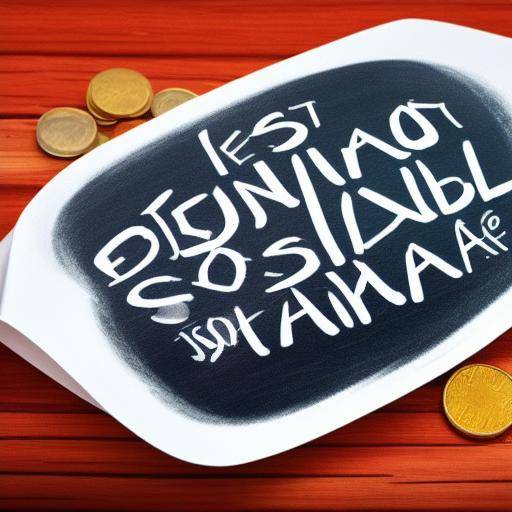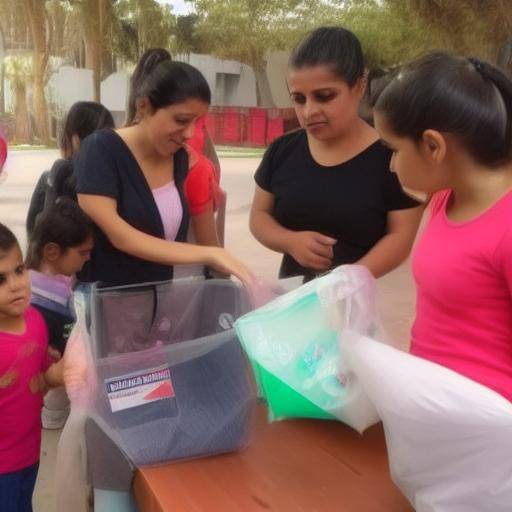
At present, the importance of a sustainable lifestyle goes beyond the preservation of the environment. A fundamental aspect that is often overlooked is its impact on family finances. Taking responsible habits, managing resources properly and fostering savings not only contribute to the well-being of the planet, but also have a direct impact on the family economy. In this article, we will explore in depth the relevance of a sustainable lifestyle for family finances, providing practical advice, comprehensive analysis and expert views.
Introduction
Living in a sustainable way does not have to be synonymous with sacrifice, on the contrary, it can optimize the economic resources of a home. In this article, we will explore how responsibility, sustainable habits and savings can be the pillars for sound and sustainable family financial management.
History and Background
The concept of sustainability has its roots in movements that seek the responsible use of natural resources. Since its inception, it has sought to reconcile human progress with the preservation of the environment. Over time, this approach has evolved into a more integrated understanding that encompasses economic, social and environmental sustainability.
The rise in sustainability in family finances has increased with global awareness of the impact of daily actions on the planet and on financial stability. People begin to realize that making responsible short-term decisions can have a long-term positive impact on the family economy.
Detailed Analysis
Benefits of Financial Responsibility
Responsibility for family finance involves making conscious decisions in managing money to meet current needs and ensure future well-being. By adopting this approach, families can reduce the risk of excessive indebtedness, increase financial stability and foster an enabling environment for investment and savings.
Challenges of Incorporating Sustainable Habits
Despite the obvious benefits, the integration of sustainable habits in family financial management presents challenges, especially in a context of impulsive consumption and a culture of discarding. Overcoming these obstacles requires a change of mentality, financial education and the adoption of more conscious habits.
Importance of Saving in a Sustainable Context
Savings are not only crucial to family financial stability, but also plays a crucial role in building a sustainable future. Saving capacity allows families to respond to unforeseen, plan long-term investments and contribute to more conscious consumption.
Comprehensive review
Financial Sustainability Practices
We will explore cases of families who have adopted sustainable practices in their daily economy, highlighting how these decisions have positively impacted their long-term finances.
Opinions of Experts and Future Perspectives
Experts on personal finance and sustainability offer their views on the relationship between responsibility, sustainable habits and savings in the family context. We also analyse future trends and how they can influence sustainable financial management.
Comparative analysis
We will compare how responsibility, sustainable habits and savings are intertwined in the context of family finance, highlighting similarities, differences and integrated strategies to maximize their positive impact.
Tips and Suggested Actions
Tips for Integrating Sustainability in Family Finance
We provide practical advice that families can implement to incorporate sustainability into their daily financial life, including consumption reduction, efficient resource management and long-term financial planning.
Reflection on Responsible Consumer
We will analyze how responsible consumption can influence long-term financial stability, providing recommendations on how to make conscious and sustainable consumption decisions.
Ideas and Industry Reviews
Perceptions of Leaders in Sustainability and Finance
Leaders in the financial and sustainability industry share their perceptions of the relationship between a sustainable lifestyle and family financial management, offering valuable insights to navigate this path effectively.
Case Studies and Practical Applications
Case studies
We present real case studies that illustrate how the adoption of a sustainable lifestyle has positively impacted family finance, highlighting concrete strategies and results.
Future Trends and Predictions
Futures in Financial Sustainability
We explore emerging trends in financial sustainability and their likely impact on the financial decisions of families, providing informed predictions on the course that this approach could take in the future.
Conclusions
In short, adopting a sustainable lifestyle not only contributes to the well-being of the planet, but can also significantly enhance the financial stability of a family. Responsibility, sustainable habits and savings are the pillars of this transformation, offering short- and long-term benefits. By integrating these principles into family financial management, economic resources can be optimized, financial vulnerability reduced and the building of a prosperous and equitable future can be helped.
Frequently asked questions
How can financial responsibility impact a family's economic stability?
Financial responsibility is fundamental to the economic stability of a family, as it lays the foundation for sustainable financial management. By making conscious and planned decisions regarding money management, families can reduce financial stress, avoid excessive indebtedness and create an enabling environment for long-term economic growth.
What sustainable habits can help improve the financial situation of a family?
The adoption of sustainable habits such as reducing consumption, recycling, efficient use of energy and long-term financial planning can have a significant impact on the financial situation of a family. These habits not only help reduce daily expenses, but also foster an enabling environment for long-term savings and investment.
Why is it important to foster savings in the context of a sustainable lifestyle?
Saving is a fundamental pillar of a sustainable lifestyle in the family environment, as it provides a financial safety net, allows for long-term investments and promotes more conscious consumption. By promoting savings, families can face unforeseen with greater tranquility, plan their financial future and contribute to building a more sustainable environment.
How can families integrate sustainability into their daily financial decisions?
The integration of sustainability into daily financial decisions begins with a conscious approach to consumption, resource management and long-term financial planning. This may include the purchase of sustainable products, the reduction of energy consumption and the incorporation of responsible financial practices in everyday life.
What long-term benefits can bring about the adoption of a sustainable lifestyle in family finance?
The adoption of a sustainable lifestyle in family finances can provide significant long-term benefits, such as reducing unnecessary expenditures, building a robust savings network, mitigating financial risks and contributing to a more stable and sustainable economic environment.
What are some practical strategies to promote responsibility, sustainable habits and savings in family financial management?
Some practical strategies include establishing a family budget based on sustainable principles, promoting financial education among family members, incorporating savings, investment and responsible consumption practices, and seeking funding alternatives that promote sustainability.
Conclusion:
Ultimately, the adoption of a sustainable lifestyle in family finances represents an opportunity to promote economic stability and, at the same time, contribute to the care of the planet. By integrating responsibility, sustainable habits and savings into family financial management, they lay the foundation for a more prosperous and equitable future. This approach not only offers tangible short-term benefits, but also builds a sustainable legacy for future generations.
With the information provided in this article, families can empower themselves to make informed and sustainable financial decisions, improving their economic well-being while contributing to environmental care.






















































